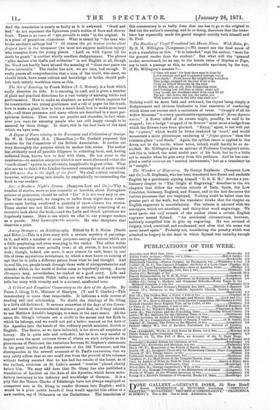A Critical and Exegetical Commentary on the Acts of the
Apostles. By Paton J. Gloag, D.D., Minister of Blantyre. (T. and T. Clarke.)—This commentary is more than respectable. It indicates a wide course of reading and real scholarship. No doubt the theology of Dr. Gloag is a little old-fashioned. It savours somewhat of the days of the Coven- ant, and treats of transcendental matters a good deal, as if they related, to use Matthew Arnold's language, to a man in the next street. All the same, Dr. Gloag's volumes are a credit to the manse and the Kirk to which he belongs, and we could not put a better manual on the Acts of the Apostles into the hands of the ordinary parish minister, Scotch or English. The doctor, as we have indicated, is far above all suspicion of heresy. He is quite safe and orthodox ; but he is so very careful to impart even the most extreme views of others on such subjects as the phenomena of Pentecost, the variations between St. Stephen's statements in his great oration and the narratives of the Old Testament, and the discrepancies in the several accounts of St. Paul's conversion, that we may safely affirm that no one could rise from the perusal of his volumes without feeling assured that he has had the results of the latest, as of the earliest, criticism on St. Luke's second "treatise " placed clearly before him.. We may add here that Dr. Gloag has also published a translation of Lechler on the Acts of the Apostles, which bears satis- factory testimony to his industry and knowledge of German. It is a pity that the Messrs. Clarke of Edinburgh have not always employed as competent men as Dr. Gloag to render German into English ; and it would be a great publics benefit if they would appoint him editor of a new version, say of Olahatuten on the Corinthians. The translation of this commentary is so badly done that one has to go to the original te find out the author's meaning, and in so doing, discovers that the trans- lator has repeatedly made the genial exegete stultify both himself and St. Paul.


































 Previous page
Previous page